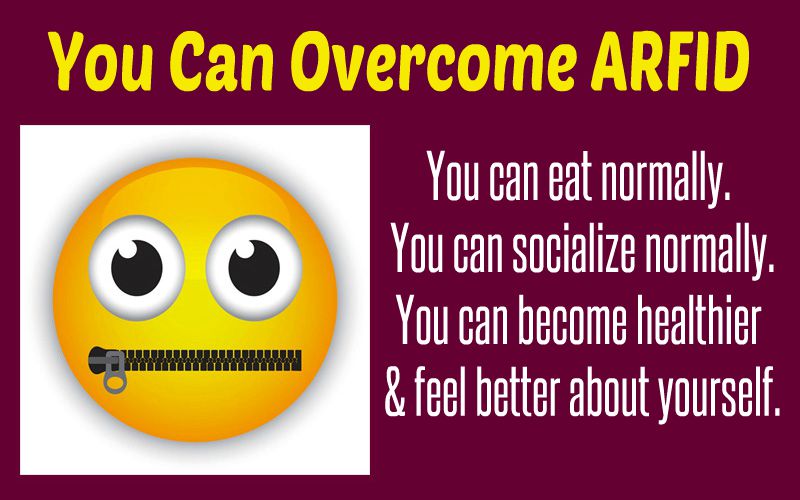Do you consider yourself a picky eater? I am not surprised. Lots of people are picky when it comes to food, with statistics showing a rise in picky eating decade by decade. However, are your finicky eating habits problematic?
Picky is a highly subjective term, encompassing people with a wide range of eating habits. Most people have preferences when it comes to food, while others have eating imperatives that MUST be followed. Still other people take pickiness to an extreme and only eat a very narrow selection of foods. When this becomes an issue in life, the person is said to suffer from ARFID or avoidant restrictive food intake disorder, formerly known as selective eating disorder.
I know quite a bit about picky eating! I had a terrible case of ARFID that started around the age of 2 and continued to rule my life until I was about 37 years of age. I have since recovered from ARFID and now am a very adventurous eater. It is possible, but it is certainly not easy to do. In fact, most people who demonstrate selective eating as an adult will never change their habits or open their mind up to food diversity.
This post will focus on defining and describing various types of pickiness when it comes to eating habits. I will also provide some special guidance for parents who fear that their child’s picky eating will cause them problems later in life.
Degrees of Being a Picky Eater
At the low end of the pickiness scale, people are merely showing preferences for certain types of food, certain food preparations and other defining characteristics of foods, such as flavor, temperature, consistency and appearance. These low level picky eaters will still eat normally, but may tend to avoid some foods in favor of others.
As we increase the degree of pickiness, eaters tend to avoid more and more foods and increasingly analyze the characteristics of foods that they find appealing or unappealing. In the middle levels of finicky eating, people might have a difficult time finding food that they want to eat in certain situations, like when dining at a restaurant. However, most people still manage to fully satisfy their nutritional needs and not cause themselves particular psychological or social difficulties with their selective eating.
At a high degree of pickiness, people might eat very few things and tend to have strong negative reactions to foods they find unappealing. These reactions might make these people uncomfortable to be around these foods and they would certainly never eat them. High levels of picky eating can be problematic socially and might begin to create health issues if the person does not receive a balanced diet with adequate nutritional content.
Extreme levels of picky eating might restrict a person to eating only a handful of foods, most often prepared a very particular way. These extremely finicky eaters often qualify to be diagnosed with ARFID, since they most likely suffer physically, psychologically and socially due to their narrow eating habits.
Just to put this all in perspective and add a first person point of view, I was definitely an extremely picky eater from the age of 2. I only ate a few foods items that would be repeated meal after meal, day after day, year after year for decades. Although my eating habits could have caused me to be unhealthy, that was not the case. I was very healthy and grew up to be big and strong, becoming a professional martial arts instructor and fitness expert. However, since I do not have the benefit of a comparison to how I might have fared if I ate normally, then maybe I did not hit my full potential due to my weird and limiting eating habits…

Picky Eating Discussion Topics
I find that many people who come to this page are looking for specific information to help them with children who are picky eaters. Others are looking for specific information about various types of picky eating. Therefore, I have prepared some bullet points to help these people with their quest for relevant info:
My child will not eat! This is a very common complaint. Did you know that picky eating is quite common in young children, with males being affected much more than females? Statistically, most children will outgrow finicky eating habits, but those who don’t might endure a lifetime of physical, psychoemotional and social problems due to their eating habits.
How can I get my child to eat? This is a difficult predicament. Some tactics are counterproductive and might make the problem worse. In extreme selective eating cases, consulting with a mental health professional might prove useful. My mother (and many other people after her) tried to get me to eat. Nothing worked. In fact, some people made me more set in my ways by constantly challenging me and my habits. Eventually one person actually cured me of my horrible ARFID condition and I owe that person a great debt… If you are interested in my story, you can read the full account in my humorous and helpful book My Food Fear.
Some people will not eat vegetables. I really do not know why so many people are hesitant to eat veggies, but I do know that this was one of the eating habits that I had for many years. Now, I love vegetables and eat them every day. Change is possible!
Many people will not eat sauces or runny textured foods. This type of textural food sensitivity ranges in its effects, but can prevent people from eating many foods with a liquidy texture. I never liked liquidy foods, like sauces and soups. I basically refused to eat them except for cheese sauce on pasta… I did not even eat pizza!
Some people will only eat packaged foods. They tend to avoid fresh foods and instead rely exclusively on store-bought items that are often preserved, low nutritional value and possibly even dangerous to overall health and wellness. I certainly fit this profile also, relying on mostly garbage foods as my only source of nutrition for decades.
Is being a picky eater a problem? Well, it certainly can be. In some cases, the condition is mild and self-regulating. In other cases, the person will outgrow the habits and eat more normally as they mature. However, some finicky eating habits will endure and might cause real issues later in life.
I always hated my eating habits. I did not understand why I could not just be normal like everyone else and eat regular foods. I was unable to change myself. Eventually, and by pure luck, I was able to cure my picky eating and have now realized just how much joy I missed in those many years of suffering from selective eating disorder. I guess it is better late than never…

Leave a Reply
You must be logged in to post a comment.